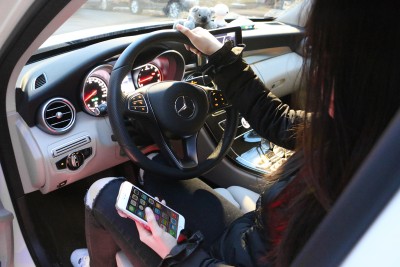
After similar legislation in neighboring states such as Connecticut, New Hampshire and New York, the Massachusetts Senate passed legislation Thursday to ban the act of driving while using mobile devices without hands-free functionality.
If passed by the Massachusetts House of Representatives, the bill will implement monetary penalties to drivers speaking or texting on handheld mobile devices. Violators would face an initial $100 fine, a second-time fine of $250 and a third-time fine of $500, a Thursday press release stated.
Sen. Mark Montigny (D-New Bedford), who sponsored the bill, said in the release that passage of the bill is “critical for motorist and pedestrian safety.”
“As a vocal critic of the significant weaknesses in the current law, I look forward to working toward the successful passage of this important piece of legislation so that we may significantly reduce the number of horrific injuries and carnage caused by distracted drivers,” Montigny said in the release.
The Massachusetts Vision Zero Coalition, a state advocacy group for safe driving, believes the bill is a “step in the right direction,” the coalition’s spokesperson, Emily Stein, said.
“It’s getting people at least aware of the fact that they shouldn’t be sitting on a phone in traffic or driving down a highway at 80 miles an hour with a phone in their hands, where they’re more likely to check a text, check an email or check social media,” Stein said. “I also know with the current texting ban, it is virtually impossible for law enforcement to safely enforce the law.”
However, Stein said she believes there are still some risks to permitting hands-free technology in the car.
“Hands-free is not risk-free,” Stein said. “There is still a risk because there’s still the component of cognitive distraction.”
Scott Paré, the deputy director of public safety at Boston University, said the use of a hands-free device is important for decreasing distractions.
“I think the advantages of doing the hands-free is that it gives you two hands on the wheel,” Paré said. “It gives you better control in case of an emergency, and we know an emergency can happen at any time.”
Sen. Michael Barrett (D-Lexington) said the bill is “too harsh,” and proposed that each of the fines be half of what the bill calls for.
“If you’re going to outlaw such a common behavior, you want to be sure that the consequences don’t fall too heavily on people of limited income,” Barrett said, “I would include both the poor and many working people and many students as people who have limited income.”
According to Barrett, the number of automobile accidents and resulting fatalities is on a decline in both the United States and in Massachusetts.
“Cars are becoming safer,” Barrett said. “They enable us to stay in our lanes and identify the bumpers in the cars in front of us and behind us. For whatever reason, we are hurting ourselves and others much less than we use to.”
Several Boston residents agreed that the bill would be a positive step for road safety in Boston.
Alex Haymer, 31, of Allston, said he agrees with the ban but thinks that hands-free devices should remain legal.
“I think you shouldn’t be texting while driving, absolutely, but I can talk to my phone and it will text for me,” he said. “I like hands-free. I’m all for voice activation and hands-free.”
Leah Ramuglia, 28, of the North End, said the lines blur when you consider cellular applications such as GPS.
“As a pedestrian, I don’t want to be killed, but there are also things like GPS,” she said. “So there’s got to be a middle ground.”
Christopher Pellot, 27, of Brighton, said he is pleased with the senate’s decision to ban the use of handheld technology.
“As you’re driving, you need as much attention on the road as possible,” he said. “In a split second, you can look down and then all of a sudden there’s either somebody there or something that can affect your life in that split second.”



















































































































